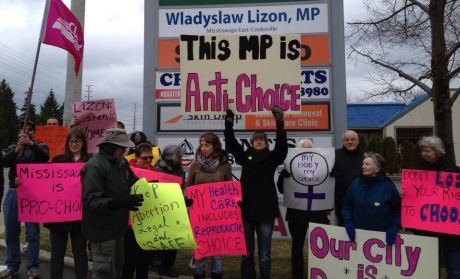Reports
You are here
Resisting Harper's attacks on choice

April 22, 2013
On a cold, wet April morning, pro-choice activists from Mississauga and Toronto turned out with signs and banners to stand up for women's reproductive rights. Passing motorists greeted them with honks of support and raised fists of solidarity.
Anti-choice attacks
The protesters were picketing the office of MP Wladyslaw Lizon (Mississauga-East Cooksville), one of three Conservative MPs who called on the RCMP to investigate all later-term abortions performed in Canada as possible homicides. Maurice Vellacott (Saskatoon—Wanuskewin) and Leon Benoit (Vegreville—Wainwright) also signed the letter to the RCMP.
This was the latest in an ongoing series of attempts to limit – or destroy – abortion rights in Canada. These threats have included a “fetal homicide bill” that would have opened the door to re-criminalizing abortion, Motion 312 calling for a parliamentary committee to study “when life begins,” and Motion 408 against sex-selection abortion.
Like all these attempts to curtail abortion rights, Lizon distorts reality. According to the Abortion Rights Coalition of Canada, less than 0.4 per cent of all abortions in Canada are performed when the pregnancy is at 20 weeks or more. They are almost always in cases of severe fetal abnormality or fetal nonviability – that is, the fetus is dead or would not survive after birth – or when the woman’s life is endangered by the pregnancy. Women who face this possibility must have a safe and legal option for terminating their pregnancy. The MPs’ attempt to equate these necessary procedures with murder shows their utter lack of compassion and concern for women.
Reproductive justice
Abortion rights are a cornerstone of women’s freedom. The ability to decide whether or not to carry a pregnancy to term is essential to women’s equality, autonomy, and dignity. Women and men across Quebec and Canada fought hard for the decriminalization of abortion. Access to abortion in Canada is still not universal: there is no abortion provider in the province of PEI, New Brunswick’s provincial health insurance does not cover abortion, and women in the North lack access to abortion services. Plus there are broader limits to choice like the denial of childcare, pay equity, and barriers created by racism, abelism, homophobia and transphobia.
The reproductive justice movement in Canada showed how this broader perspective can mobilize to strike down the abortion law.
Prime Minister Stephen Harper continues to claim he will not re-open the abortion debate, while MPs from his government continue to do exactly that. In the vote on Motion 312 to study “when life begins,” 10 cabinet ministers voted in favour—including the Minister for the Status of Women Rona Ambrose, and Immigration Minister Jason Kenney, one of the most powerful people in Parliament. But the motion was defeated, and anger against it derailed the next motion, Motion 408.
All attempts to limit abortion rights in Canada must be met with swift and loud protest, as part of the broader movement for reproductive justice.
If you like this article, register now for Marxism 2013: Revolution In Our Time, a weekend long conference of ideas to change the world. Sessions include "Socialism, feminism and the fight for reproductive justice," "Women, resistance and revolution," and "The fight for trans liberation."
Section:









